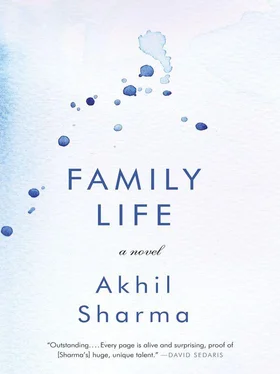My mother and I began to be invited to people’s houses so that their children could see me and realize that boys who were ranked first looked and sounded like anybody else.
One night, I sat between two girls, six and ten, at a dining-room table. My mother and the girls’ parents, both doctors, sat across from me. I spoke and spoke. I remembered how my father had talked when we sat in Mr. Gupta’s Mercedes.
“For Indians, it is important to do well in English. There are so many of us who do well in math that colleges don’t pay math and science much attention.”
The mother of the girls asked, “These teachers — they don’t favor their own?” She said this in Hindi, as if this fear of favoritism, which was a reasonable one in India, prompted her to speak like she was still there.
Her husband asked whether I played Atari and whether I thought it was worth buying a computer. “A typewriter is all one needs,” I said. Like his wife, the man also spoke timidly. I found it strange that two doctors could have fears.
A few of the men we visited appeared to see me as competition. One man twisted my earlobe and said, “So, genius, you are very smart.” Another man had me sit on a white sofa while he sat on a white easy chair at a right angle from me. Then, he tested me on how much I knew. He asked what words “percent” was a contraction of and how many elements were on the periodic table.
I felt important because of my class rank. Soon after tenth grade started, I tried getting a girlfriend.
Rita was five foot three. She had thick eyebrows, a heart-shaped face, and wavy hair that fell to her shoulders. She spoke without an accent. This and the fact that she sat with white girls at lunch placed her in a better world than mine.
One afternoon I phoned her from my parents’ room. I paced by my parents’ bed, the phone to my ear. My mother had just prayed, and there was an incense stick smoking on the altar. The phone began to ring on the other end.
“Hello?” a girl said.
“Is Rita there?” I asked. I stood looking out a window. Outside, the trees were changing color.
“Yes. Hold on. Who’s this?”
“Ajay.”
“Ajay from Morristown?”
“From school.”
“Rita,” the girl screamed.
A moment later, there was an echo as an extension was lifted.
“Who’s this?” another girl said.
I thought this was Rita but wasn’t sure. “Rita?”
“Yes.”
“It’s Ajay.”
“Ajay from Morristown?”
“No. From school.”
“Ajay?”
“We’re in math class together.”
“OK.”
There was silence. I had decided to tell Rita I loved her. This was because from having watched Hindi movies, it seemed that if one was to have a relationship with a girl, one had to be in love. Also, it seemed easier to say I loved her than to have a conversation. “I think you’re very beautiful,” I said.
Rita didn’t reply. I became silent again. I stared out the picture window above my parents’ bed. Our backyard ran into another, and this second yard into a third, and the leaves of the trees were gold and orange.
“You are the most beautiful girl in school.” My face and neck were burning.
“Thank you.”
“Would you like to go on a date?”
Rita was silent for a moment.
“With you?”
“Yes.”
“No.”
I began to make excuses for having called. “I only asked because I thought you didn’t have a boyfriend.”
Suddenly Rita shrieked, “Are you on the phone?”
“Yes,” I murmured.
“Get off. Get off.”
I heard the “huh, huh, huh” of somebody laughing.
“Get off.”
I wanted to hang up. “I love you.” I felt somehow obligated to say this.
“Huh, huh, huh,” went the other person on the line.
“I’ll call you back,” Rita said.
“Do you need my phone number?”
She hung up.
For a few days I was embarrassed. The first time I entered math class after the call, I saw Rita and my entire back became hot.
I KNEW ENOUGH ABOUT myself to realize that I had to immediately try again with another girl. If I didn’t, I would seize up with shyness. With this second girl, I tried not to be too ambitious.
Minakshi was not pretty. She was shorter than Rita and had a worried, pinched face. When she walked down the school’s hallways, she kept both straps of her book bag over her shoulders, and she hunched forward as if carrying a heavy burden. Minakshi’s father owned a television repair shop and said that he was an engineer, though my father said that it was obvious that he had not even finished high school. Right after we brought Birju from the nursing home, Mr. Nair had suggested we transport Birju to his house and try dipping him into his swimming pool. Mr. Nair was very conservative. My mother had once volunteered my father to drive Minakshi and her sisters somewhere, and Mrs. Nair had said her husband did not like men who were not relatives to be alone with their daughters.
One afternoon, Minakshi was walking down a set of the school’s stairs. She was holding a binder across her chest and she looked pained, as she often did. I was climbing the stairs. There were boys and girls around us and their footsteps and voices made the stairwell loud. Passing her, I said, “I love you.” I said this in an ordinary conversational voice. Minakshi continued down the stairs. She seemed not to have heard.
A few days later, she was kneeling by her locker, a forest of jean-clad legs around her. I went up to her and, walking swiftly, dropped a scrap of paper in her hair. She grabbed the top of her head, looking angry, like someone used to being treated badly. I remembered being spat on while crouched before my locker. The note said, “I love you.”
For a while I continued trying to hide myself when I told Minakshi I loved her. We were in the same gym class. Running past her in her big, baggy shorts, banging a basketball against the floor, I whispered, “I love you.” Sometimes she appeared to have heard me. She would look around open mouthed.
Telling Minakshi I loved her, slipping notes through the grill of her locker door, was like taking part in an adventure. I also, though, regularly blamed Minakshi for the nervousness I was experiencing from telling her I loved her.
About a week after I started doing this, I was walking down a hallway and she was walking toward me. The hallway was crowded and noisy. There were voices and locker doors slamming and rattling. I was thinking about whether it was possible to drift across the hall toward Minakshi, whisper my love, and disappear without being noticed.
Minakshi saw me and stopped. I came near her. We were two or three feet apart. She was wearing a shiny pink blouse. “Ajay,” she said. I stopped. She crossed over toward me. She looked hurt. “Are you the one telling me you love me?”
I worried she might tell her parents, who would then inform my mother. I was afraid, though, of passing up the opportunity of getting a girlfriend. “Yes.”
“OK. We can talk after school.” She walked away.
Immediately I felt regret. To me, all relationships were serious and full of obligations, and the idea of having one suddenly felt like a burden.
At the end of the day, Minakshi and I met outside our school’s doors. Yellow buses lined the horseshoe driveway. We walked up toward the road. At first we didn’t talk. My mouth was dry. When we reached the road, we turned right, in the direction of where she lived. The sidewalk went up a slope. Both of us were bent under our book bags.
A part of me was still afraid that Minakshi was going to threaten to tell her mother. I had known boys who had approached girls, and the girls had done so.
Minakshi, not looking at me, said, “My father won’t let me receive phone calls.”
Читать дальше












